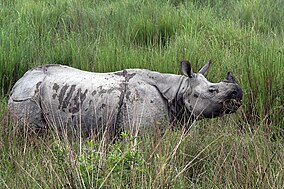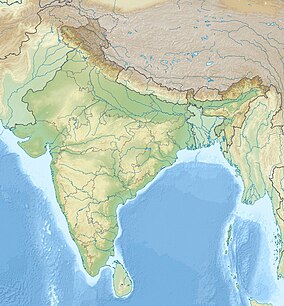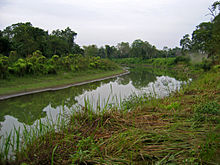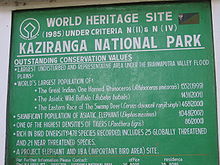Kaziranga National Park(Assamese: কাজিৰঙা ৰাষ্ট্ৰীয় উদ্যান,Kazirônga Rastriyô Udyan, pronounced[kazirɔŋa rastrijɔ udjan]) is a national park in the Golaghat and Nagaon districts of the state of Assam, India. AWorld Heritage Site, the park hosts two-thirds of the world's great one-horned rhinoceroses.[1] According to the latest census held in March, 2015, the current Rhino population in Kaziranga National Park is 2401 as published by the Forest Department under Govt. of Assam, an operation conducted by the department officials in association with some recognized wildlife NGOs. The 2015 census revealed rhino population as 1,651 adults (663 males, 802 females, 186 unsexed), 294 sub-adults (90 males, 114 females, 90 unsexed), 251 juveniles and 205 cubs. [2] Kaziranga boasts the highest density of tigers amongprotected areas in the world and was declared a Tiger Reserve in 2006. The park is home to large breeding populations of elephants, wild water buffalo, and swamp deer.[3] Kaziranga is recognized as an Important Bird Area byBirdlife International for conservation of avifaunal species. Compared to other protected areas in India, Kaziranga has achieved notable success in wildlife conservation. Located on the edge of theEastern Himalaya biodiversity hotspot, the park combines high species diversity and visibility.
Quick facts: Location, Nearest city ...
Close
Kaziranga is a vast expanse of tallelephant grass, marshland, and densetropical moist broadleaf forests, crisscrossed by four major rivers, including the Brahmaputra, and the park includes numerous small bodies of water. Kaziranga has been the theme of several books, songs, and documentaries. The park celebrated its centennial in 2005 after its establishment in 1905 as a reserve forest.
History
Main article: History of Kaziranga National Park

Mary Curzon, Baroness Curzon of Kedleston and her husband are credited with starting the movement to protect this area
The history of Kaziranga as a protected area can be traced back to 1904, whenMary Curzon, Baroness Curzon of Kedleston, the wife of the Viceroy of India, Lord Curzon of Kedleston, visited the area.[citation needed] After failing to see a single rhinoceros, for which the area was renowned, she persuaded her husband to take urgent measures to protect the dwindling species which he did by initiating planning for their protection.[4] On 1 June 1905, the Kaziranga Proposed Reserve Forest was created with an area of 232 km2(90 sq mi).[5]
Over the next three years, the park area was extended by 152 km2 (59 sq mi), to the banks of the Brahmaputra River.[6][not in citation given] In 1908, Kaziranga was designated a Reserve Forest. In 1916, it was redesignated as a game sanctuary—The Kaziranga Game Sanctuary—and remained so till 1938, when hunting was prohibited and visitors were permitted to enter the park.[citation needed]
The Kaziranga Game Sanctuary was renamed the Kaziranga Wildlife Sanctuary in 1950 by P. D. Stracey, the forest conservationist, in order to rid the name of hunting connotations.[citation needed] In 1954, the government of Assam passed the Assam (Rhinoceros) Bill, which imposed heavy penalties for rhinoceros poaching.[citation needed] Fourteen years later, in 1968, the state government passed the Assam National Park Act of 1968, declaring Kaziranga a designated national park.[citation needed] The 430 km2(166 sq mi) park was given official status by the central government on 11 February 1974. In 1985, Kaziranga was declared a World Heritage Site byUNESCO for its unique natural environment.
Kaziranga has been the target of several natural and man-made calamities in recent decades. Floods caused by the overflow of the river Brahmaputra, leading to significant losses of animal life.[7] Encroachment by people along the periphery has also led to a diminished forest cover and a loss of habitat.[citation needed] An ongoing separatist movement in Assam led by the United Liberation Front of Asom(ULFA) has crippled the economy of the region,[8] but Kaziranga has remained unaffected by the movement; indeed, instances of rebels from the United Liberation Front of Assam protecting the animals and, in extreme cases, killing poachers, have been reported since the 1980s.[4]
Etymology
Although the etymology of the name Kaziranga is not certain, there exist a number of possible explanations derived from local legends and records. According to one legend, a girl named Ranga, from a nearby village, and a youth named Kazi, from Karbi Anglong, fell in love. This match was not acceptable to their families, and the couple disappeared into the forest, never to be seen again, and the forest was named after them.[citation needed]According to another legend, Srimanta Sankardeva, the sixteenth centuryVaisnava saint-scholar, once blessed a childless couple, Kazi and Rangai, and asked them to dig a big pond in the region so that their name would live on.[9]
Testimony to the long history of the name can be found in some records, which state that once, while the Ahom king Pratap Singha was passing by the region during the seventeenth century, he was particularly impressed by the taste of fish, and on asking was told it came from Kaziranga.[10] Kaziranga also could mean the "Land of red goats (Deer)", as the word Kazi in the Karbi language means "goat", and Rangai means "red".[10]
Some historians believe, however, that the name Kaziranga was derived from the Karbi word Kajir-a-rang, which means"the village of Kajir" (kajiror gaon). Among the Karbis, Kajir is a common name for a girl child,[citation needed] and it was believed that a woman named Kajir once ruled over the area. Fragments ofmonoliths associated with Karbi rule found scattered in the area seem to bear testimony to this assertion.
Geography
Main article: Geography of Kaziranga National Park
Kaziranga is located between latitudes 26°30' N and 26°45' N, and longitudes 93°08' E to 93°36' E within two districts in the Indian state of Assam—theKaliabor subdivision of Nagaon districtand the Bokakhat subdivision ofGolaghat district.[citation needed]
The park is approximately 40 km (25 mi) in length from east to west, and 13 km (8 mi) in breadth from north to south.[11]Kaziranga covers an area of 378 km2(146 sq mi), with approximately 51.14 km2 (20 sq mi) lost to erosion in recent years.[11] A total addition of 429 km2 (166 sq mi) along the present boundary of the park has been made and designated with separate national park status to provide extended habitat for increasing the population of wildlife or, as a corridor for safe movement of animals to Karbi Anglong Hills.[12] :p.06Elevation ranges from 40 m (131 ft) to 80 m (262 ft).[citation needed] The park area is circumscribed by the Brahmaputra River, which forms the northern and eastern boundaries, and the Mora Diphlu, which forms the southern boundary. Other notable rivers within the park are the Diphlu and Mora Dhansiri.[13] :p.05
Kaziranga has flat expanses of fertile,alluvial soil, formed by erosion and silt deposition by the River Brahmaputra.[citation needed] The landscape consists of exposedsandbars, riverine flood-formed lakes known as, beels, (which make up 5% of the surface area),[citation needed] and elevated regions known as, chapories, which provide retreats and shelter for animals during floods. Many artificialchapories have been built with the help of the Indian Army to ensure the safety of the animals.[14][15] Kaziranga is one of the largest tracts of protected land in the sub-Himalayan belt, and due to the presence of highly diverse and visible species, has been described as a"biodiversity hotspot".[16] The park is located in the Indomalaya ecozone, and the dominant biomes of the region areBrahmaputra Valley semi-evergreen forests of the tropical and subtropical moist broadleaf forests biome and a frequently flooded variant of the Terai-Duar savanna and grasslands of thetropical and subtropical grasslands, savannas, and shrublands biome.
Climate
Main article: Climate of Kaziranga National Park
The park experiences three seasons: summer, monsoon, and winter. The winter season, between November and February, is mild and dry, with a mean high of 25 °C (77 °F) and low of 5 °C(41 °F).[citation needed] During this season,beels and nallahs (water channels) dry up.[13]:p.06 The summer season between March and May is hot, with temperatures reaching a high of 37 °C(99 °F).[citation needed] During this season, animals usually are found near water bodies.[13]:p.06 The rainy monsoon season lasts from June to September, and is responsible for most of Kaziranga's annual rainfall of 2,220 mm (87 in).[citation needed] During the peak months of July and August, three-fourths of the western region of the park is submerged, due to the rising water level of the Brahmaputra. The flooding causes most animals to migrate to elevated and forested regions outside the southern border of the park, such as the Mikir hills. 540 animals,including 13 rhinos and mostly hog deers perished in unprecedented floods of 2012.[17] [18]However, occasional dry spells create problems as well, such as food shortages and occasional forest fires.[19]
Fauna
Main article: Fauna of Kaziranga National Park
Kaziranga contains significant breeding populations of 35 mammalian species,[20] of which 15 are threatenedas per the IUCN Red List.[citation needed]The park has the distinction of being home to the world's largest population of the Greater One-Horned Rhinoceros(1,855),[21][22] wild Asiatic water buffalo(1,666)[23] and eastern swamp deer(468).[24] Significant populations of large herbivores include elephants (1,940),[25]gaur (30) and sambar (58). Small herbivores include the Indian muntjac,wild boar, and hog deer.[18][26] Kaziranga has the largest population of the Wild water buffalo anywhere accounting for about 57% of the world population.[27]
Kaziranga is one of the few wild breeding areas outside Africa for multiple species of large cats, such asIndian tigers and leopards.[20] Kaziranga was declared a Tiger Reserve in 2006 and has the highest density of tigers in the world (one per five km2), with a population of 118,according to the latest census.[21] Other felids include thejungle cat, fishing cat, and leopard cat.[20] Small mammals include the rarehispid hare, Indian gray mongoose,small Indian mongooses, large Indian civet, small Indian civets, Bengal fox,golden jackal, sloth bear, Chinese pangolin, Indian pangolins, hog badger,Chinese ferret badgers, andparticoloured flying squirrel.[18][20][citation needed] Nine of the 14primate species found in India occur in the park.[4] Prominent among them are the Assamese macaque, capped andgolden langur, as well as the only apefound in India, the hoolock gibbon.[18][20][citation needed] Kaziranga's rivers are also home to the endangeredGanges dolphin.[citation needed]

An Indian roller at Kaziranga
Kaziranga has been identified by Birdlife International as an Important Bird Area.[28] It is home to a variety of migratory birds, water birds, predators, scavengers, and game birds. Birds such as the lesser white-fronted goose,ferruginous duck, Baer's pochard duckand lesser adjutant, greater adjutant,black-necked stork, and Asian openbillstork migrate from Central Asia to the park during winter.[29] Riverine birds include the Blyth's kingfisher, white-bellied heron, Dalmatian pelican, spot-billed pelican, Nordmann's greenshank, and black-bellied tern.[29]:p.10 Birds of prey include the rare eastern imperial,greater spotted, white-tailed, Pallas's fish eagle, grey-headed fish eagle, and thelesser kestrel.[30]
Kaziranga was once home to seven species of vultures, but the vulture population reached near extinction, supposedly by feeding on animal carcasses containing the drugDiclofenac.[31] Only the Indian vulture,slender-billed vulture, and Indian white-rumped vulture have survived.[31] Game birds include the swamp francolin,Bengal florican, and pale-capped pigeon.[29]:p.03
Other families of birds inhabiting Kaziranga include the great Indian hornbill and wreathed hornbill, Old World babblers such as Jerdon’s and marsh babblers, weaver birds such as the common baya weaver, threatened Finn's weavers, thrushes such as Hodgson's bushchat and Old World warblers such as the bristled grassbird. Other threatened species include the black-breasted parrotbill and the rufous-vented prinia.[29]:p.07–13
Two of the largest snakes in the world, the reticulated python and rock python, as well as the longest venomous snake in the world, the king cobra, inhabit the park. Other snakes found here include the Indian cobra, monocled cobra,Russell's viper, and the common krait.[20]Monitor lizard species found in the park include the Bengal monitor and thewater monitor.[20] Other reptiles include fifteen species of turtle, such as theendemic Assam roofed turtle and one species of tortoise, the brown tortoise.[20] 42 species of fish are found in the area, including the Tetraodon.[20]
See also: List of mammals in Kaziranga National Park, List of reptiles in Kaziranga National Park, List of fishes in Kaziranga National Park and List of birds in Kaziranga National Park
Flora
Four main types of vegetation exist in this park.[32] These are alluvial inundated grasslands, alluvial savanna woodlands,tropical moist mixed deciduous forests, and tropical semi-evergreen forests. Based on Landsat data for 1986, percent coverage by vegetation is: tall grasses 41%, short grasses 11%, open jungle 29%, swamps 4%, rivers and water bodies 8%, and sand 6%.[33]
There is a difference in altitude between the eastern and western areas of the park, with the western side being at a lower altitude. The western reaches of the park are dominated by grasslands. Tall elephant grass is found on higher ground, while short grasses cover the lower grounds surrounding the beels or flood-created ponds.[citation needed] Annual flooding, grazing by herbivores, andcontrolled burning maintain and fertilize the grasslands and reeds. Common tall grasses are sugarcanes, spear grass,elephant grass, and the common reed. Numerous forbs are present along with the grasses. Amidst the grasses, providing cover and shade are scattered trees—dominant species includingkumbhi, Indian gooseberry, the cotton tree (in savanna woodlands), andelephant apple (in inundated grasslands).[citation needed]
Thick evergreen forests, near the Kanchanjhuri, Panbari, and Tamulipathar blocks, contain trees such asAphanamixis polystachya, Talauma hodgsonii, Dillenia indica, Garciniatinctoria, Ficus rumphii, Cinnamomumbejolghota, and species of Syzygium. Tropical semi-evergreen forests are present near Baguri, Bimali, and Haldibari. Common trees and shrubs areAlbizia procera, Duabanga grandiflora,Lagerstroemia speciosa, Crateva unilocularis, Sterculia urens, Grewiaserrulata, Mallotus philippensis, Brideliaretusa, Aphania rubra, Leea indica, andLeea umbraculifera.[34]
There are many different aquatic floras in the lakes and ponds, and along the river shores. The invasive water hyacinthis very common, often choking the water bodies, but it is cleared during destructive floods.[citation needed] Another invasive species, Mimosa invisa, which istoxic to herbivores, was cleared by Kaziranga staff with help from theWildlife Trust of India in 2005.[35]
Administration
Main article: Governance of Kaziranga National Park
The Wildlife wing of the forest department of the Government of Assam, headquartered at Bokakhat, is responsible for the administration and management of Kaziranga.[13]:p.05 The administrative head of the park is the Director, who is a Chief Conservator of Forests-level officer. A divisional Forest Officer is the administrative chief executive of the park. He is assisted by two officers with the rank of Assistant Conservator of Forests. The park area is divided into five ranges, overseen by Range Forest Officers.[13]:p.11 The five ranges are the Burapahar (HQ: Ghorakati), Western (HQ: Baguri), Central (HQ: Kohora), Eastern (HQ: Agaratoli) and Northern (HQ: Biswanath). Each range is further sub-divided into beats, headed by a forester, and sub-beats, headed by a forest guard.[13]:p.11 Theofficial website of the Park is http://kaziranga.assam.gov.in
The park receives financial aid from the State Government as well as theMinistry of Environment, Forests & Climate Change of Government of India under various Plan and Non-Plan Budgets. Additional funding is received under the Project Elephant from the Central Government. In 1997–1998, a grant of US$ 100,000 was received under the Technical Co-operation for Security Reinforcement scheme from the World Heritage Fund.[15]:p.02Additional funding is also received from national & international Non-governmental organizations.
&
Conservation management
Main article: Conservation Management of Kaziranga National Park

Census figures for elephant andrhinoceros in Kaziranga
Kaziranga National Park has been granted maximum protection under the Indian law for wildlife conservation. Various laws, which range in dates from the Assam Forest Regulation of 1891 and the Biodiversity Conservation Act of 2002have been enacted for protection of wildlife in the park.[15]:p.01 Poaching activities, particularly of the rhinoceroses for its horn, has been a major concern for the authorities. Between 1980 and 2005, 567 rhinoceroses were hunted by poachers.[13]:p.10 Following a decreasing trend for the past few years, 18 one-horned rhinoceroses were killed by poachers in 2007.[36] Reports have suggested that there are links between these poaching activities and funding of terrorism#Organisation.[37][38] But these could not be substantiated in later years. Preventive measures such as construction of anti-poaching camps and maintenance of existing ones, patrolling, intelligence gathering, and control over the use of firearms around the park have reduced the number of casualties.[39][40] Since 2013, the park used cameras on drones which are monitored by security guards to protect the rhino from armed poachers.[41]
Perennial flooding and heavy rains have resulted in death of wild animals and damage to the conservation infrastructures.[12] To escape the water-logged areas, many animals migrate to elevated regions outside the park boundaries where they are susceptible to hunting, hit by speeding vehicles, or subject to reprisals by villagers for damaging their crops.[citation needed] To mitigate the losses, the authorities have increased patrols, purchased additional speedboats for patrol, and created artificial highlands for shelter.[citation needed] Several corridors have been set up for the safe passage of animals across National Highway–37 which skirts around the southern boundary of the park.[42] To prevent the spread of diseases and to maintain the genetic distinctness of the wild species, systematic steps such as immunization of livestock in surrounding villages and fencing of sensitive areas of the park, which are susceptible to encroachment by local cattle, are undertaken periodically.[citation needed]
Water pollution due to run-off from pesticides from tea gardens, and run-off from a petroleum refinery at Numaligarh, pose a hazard to the ecology of the region.[13]:p.24 Invasive species such asMimosa and wild rose have posed a threat to the native plants in the region. To control the growth and irradiation of invasive species, research on biological methods for controlling weeds, manual uprooting and weeding before seed settling are carried out at regular intervals.[citation needed] Grassland management techniques, such ascontrolled burning, are effected annually to avoid forest fires.[18]
Visitor activities
Main article: Tourism in Kaziranga National Park

Bonoshree Tourist Lodge in Kaziranga, maintained byGovernment of Assam
Observing the wildlife, including birding, is the main visitor activity in and around the park. Guided tours by elephant orJeep are available. Hiking is prohibited in the park to avoid potential human-animal conflicts. Observation towers are situated at Sohola, Mihimukh, Kathpara, Foliamari, and Harmoti for wildlife viewing. The Lower Himalayan peaksframe the park's landscape of trees and grass interspersed with numerousponds. An interpretation centre is being set up at the Bagori range of Kaziranga, to help visitors learn more about the park.[43] The park remains closed for visitors from 01 May to end-October due to monsoon rains. Four tourist lodges at Kohora and three tourist lodges outside the park are maintained by theDepartment of Environment and Forests, Government of Assam. Private resorts are available outside the park borders.[12]:p.19 Increase in tourist inflow has led to the economic empowerment of the people living at the fringes of the park, by means of tourism related activities, encouraging a recognition of the value of its protection.[10]:pp.16–17 A survey of tourists notes that 80 percent found rhino sightings most enjoyable and that foreign tourists were more likely to support park protection and employment opportunities financially, while local tourists favored support for veterinary services.[44]
Transport
Authorised guides of the forest department accompany all travelers inside the park. Mahout-guided elephant rides and Jeep or other 4WD vehicles rides are booked in advance. Starting from the Park Administrative Centre atKohora, these rides can follow the three motorable trails under the jurisdiction of three ranges—Kohora, Bagori, and Agaratoli. These trails are open for light vehicles from November to end Apr. Visitors are allowed to take their own vehicles when accompanied by guides.[citation needed]
Buses owned by Assam State Transport Corporation and private agencies between Guwahati, Tezpur, and Upper Assam stop at the main gate of Kaziranga on NH 37 at Kohora.[45] The nearest town is Bokakhat 23 kilometres (14 mi) away. Major cities near the park are Guwahati (217 kilometres (135 mi)) and Jorhat (97 kilometres (60 mi)).Furkating 75 kilometres (47 mi), which is under the supervision of Northeast Frontier Railway, is the nearest railway station.[citation needed] Jorhat Airport at Rowriah (97 kilometres (60 mi) away),Tezpur Airport at Salonibari (approx 100 kilometres (62 mi) away), and Lokpriya Gopinath Bordoloi International Airportin Guwahati (approximately 217 kilometres (135 mi) away) are the nearby airports.[citation needed]. Transportation is also available from Guwahati to Kaziranga National Park and other places in Assam.
In popular culture
Kaziranga has been the theme of, or has been mentioned in, several books, songs, and documentaries. The park first gained international prominence after Robin Banerjee, a physician turned photographer and filmmaker, produced a documentary titled Kaziranga, which aired on Berlin television in 1961 and became a runaway success.[46][47][48]American science fiction and fantasy author, L. Sprague de Camp wrote about the park in his poem, "Kaziranga, Assam". It was first published in 1970 in Demons and Dinosaurs, a poetry collection, and was reprinted as Kaziranga in Years in the Making: the Time-Travel Stories of L. Sprague de Camp in 2005.[citation needed]
Kaziranga Trail (Children's Book Trust, 1979), a children's storybook by Arup Dutta about rhinoceros poaching in the national park, won the Shankar's Award.[49] The Assamese singer Bhupen Hazarika refers to Kaziranga in one of his songs.[24] The BBC conservationistand travel writer, Mark Shand, authored a book and the corresponding BBC documentary Queen of the Elephants, based on the life of the first female mahout in recent times—Parbati Baruaof Kaziranga. The book went on to win the 1996 Thomas Cook Travel Book Award and the Prix Litteraire d'Amis, providing publicity simultaneously to the profession of mahouts as well as to Kaziranga.[50]
























No comments:
Post a Comment